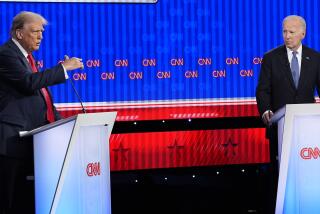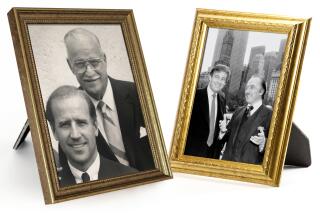Read His Lips: He’s No Wimp the Younger
- Share via
George W. Bush wasted no time in confronting the question that haunted his father’s presidency. Whatever other reasons he may have had for last week’s bombing of Iraq, the new president clearly wanted to show that he was prepared to act like a man.
His father, who was so plagued by masculinity questions, did not wait for the election to be decided before he asserted the younger Bush’s manhood. When, a few days after the election, ABC reporter Sam Donaldson asked the former president how his son was reacting to the roller coaster of the Florida vote, George the elder replied: “Like a man, with great strength.”
With this brief proclamation, the elder Bush indicated his own insecurities, and also something that lies beneath much of politics throughout history.
Just look at the 2000 election. It featured a Democratic candidate who hired a feminist to advise him on how to look like an “alpha male,” opposing a Republican candidate whose father had been tormented by insinuations that he was a “wimp.” President Bush the Elder had tried to show his manhood prior to the Persian Gulf War by proudly declaring about Saddam Hussein: “If we get into an armed situation, he’s going to get his ass kicked.”
A few years earlier, Garry Trudeau had begun calling the senior Bush a wimp in his cartoon “Doonesbury.” Trudeau also said Bush had placed his manhood in a blind trust. Cartoonist Pat Oliphant added to Bush’s agony by portraying him carrying a purse over his shoulder, wearing high heels and a skirt. And Newsweek magazine had a cover story on Bush’s “wimp factor.”
It seems clear that a desire to liberate himself from such unmanly images played a role in former President Bush’s eagerness to have a war to liberate Kuwait. “You’re talking to the wimp,” a still-seething Bush said to reporters 2 1/2 months after the end of the Persian Gulf War.
Such anxieties are by no means confined to the Bush family. Insecure masculinity has, in fact, been a major force in history. Sexually insecure men often seek validation of their manhood by pursuing power. “But he was a man!” a trembling Richard M. Nixon affirmed of Theodore Roosevelt as Nixon concluded his rambling talk to the White House staff at the time of his resignation in 1974. There can be little doubt that the disgraced president had himself in mind as he referred to this particular predecessor.
Insecure masculinity was a major motivation for several other 20th century presidents, from Teddy Roosevelt at the century’s beginning to Bill Clinton at its end. The Republican Roosevelt is a prime example. One reason for Roosevelt’s concern about proving his manhood was his feeling of shame that his father had paid for a substitute to fight in his place during the Civil War. Roosevelt spoke of almost everything in sexual terms. He said war was a necessary arena for the display of “manly virtues” and frequently referred to adversaries as “eunuchs” or “impotent.” And it does not take a Freudian imagination to understand why Roosevelt used the “big stick” as his metaphor for military might.
Similar anxieties appear to have driven John F. Kennedy and his disciple Clinton to try to show their manhood by treating women as disposable playthings. And it could be argued that Lyndon B. Johnson took the nation into a war that he knew would be disastrous partly out of a desire to prove his manhood. “There’s not anything that’ll destroy you as quick as pulling out,” Johnson told Sen. Richard Russell in 1964. “They’ll forgive you anything except being weak. We’ve got to conduct ourselves like men.” As had Roosevelt, Johnson often described male opponents of his war policy by names that indicated they were like women.
Although sexual insecurity often motivates men to seek power, it is not a prerequisite for achieving high political position. Sometimes men who seem to be relatively secure in their sexuality manage to rise to the top. Jimmy Carter, for example, confined his lusting to his heart and has been noted for his ability to reconcile conflicting parties without having to resort to macho tactics.
Unfortunately, though, political leaders who have been intent on proving to themselves and others that they fit the accepted definition of manhood as the polar opposite of womanhood have been more common. Last week, President Bush may have fired a preemptive strike in Iraq to head off any suggestion that his middle initial stands for “wimp.”
More to Read
Sign up for Essential California
The most important California stories and recommendations in your inbox every morning.
You may occasionally receive promotional content from the Los Angeles Times.













